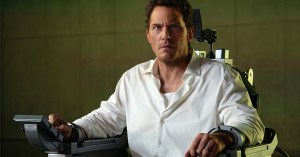10 Certified Fresh Psychological Thrillers
Black Swan
A companion piece of sorts to The Wrestler, Black Swan stars Natalie Portman and Mila Kunis as ballet rivals angling for the lead in a Swan Lake adaptation. As the competition heats up, so too does Portman’s vivid hallucinations and bizarre occuerences around her. What is she seeing? And why? Darren Aronofsky directs with unstoppable force, concoting a shamelessly melodramatic and profoundly grand psychological thriller. The movie gave Portman an Academy Award, and gave us the image of the two leads in a darkroom imprinted permanently onto our brains.
The Machinist
Otherwise known as “that movie nobody’s really seen but Christian Bale lost a lot of weight for” — because he’s so serious about his craft; hence the tortured Batman growl — this is the story of an industrial worker who begins to question his sanity when he develops chronic insomnia. Ghosts, mysterious post-it notes (scary!), and monotone 2000s cinematography ensue. Oh, the pain.
A Tale of Two Sisters
South Korea’s Kim Ji-woon (I Saw the Devil, The Good, the Bad, the Weird) is an unabashed fan of genre fare, and A Tale of Two Sisters, a psych thriller/horror hybrid, was the first film of his to garner him international recognition. The plot centers on adolescent Su-mi, who has returned home with her younger sister Su-yeon from psychiatric care to face the stepmother she hates and the father she resents. As tensions rise in the household, supernatural visions begin to haunt Su-mi, but determining what is real and what is imaginary is up to the viewer. A skillful and measured blend of suspense, paranoia, and sheer terror, A Tale of Two Sisters‘s “a-ha” moment is certainly satisfying, but the fact that you soiled your britches getting to that moment is what makes it so fun.
Mulholland Drive
Mulholland Drive isn’t an ordinary mystery; you’ll have it all figured out pretty early — until halfway through the movie, when Lynch pulls the rug out from underneath you, rolls it up, fills it with his giddy ideas, and forces you to smoke it. The film initially follows a woman with amnesia (Laura Harring), an aspiring actress (Naomi Watts in a breakout performance), and a hotshot movie director (Justin Theroux), all living in Los Angeles, but ultimately takes these threads and weaves a dark and grimy tale of obsession, conspiracy, and murder set against the backdrop of Hollywood. A Hollywood, by the way, that includes cowboys, hitmen, and demonic elderly couples.
Frailty
Bill Paxton’s directorial debut is a gripping, slowburning Southern tension. In a story mainly told through a series of flashbacks, Paxton portrays a rural single father who one night recieves a vision from God telling him to cleanse the world of a few demons. The demons? Oh, yeah, they’re disguised as people. It’s all a very sordid affair, with Paxton’s two boys split on the path their father has taken them: one believes, the other a horrifed skeptic. And we see that the effects will last well into adulthood…
Memento
Christopher Nolan’s Memento essentially begins at the end of its story and invites the audience to retrace its steps alongside its protagonist, long term memory-deficient Leonard Shelby (Guy Pearce), who’s attempting to unravel the mystery behind his wife’s rape and murder. Alternately told in chronological order (the past, shown in black-and-white) and reverse chronological order (the present, in color), Nolan’s mind-bending script never quite lets on what’s happening until the last possible moment, beginning with a bang (literally) and sustaining its tension and sense of disorientation so effectively that — wait, what were we talking about again?
Seven
Plenty of cinematic criminals toy with the cops, but few go to as great a length as John Doe, the methodical, Biblically-versed slayer in Seven. Detectives William Somerset (Morgan Freeman) and David Mills (Brad Pitt) are on the trail of a particularly nasty serial killer — one whose brutal body of work is inspired by the seven deadly sins — and after a while it becomes clear that the man they’re after may be sending them a message. David Fincher rocketed to the directorial A-list with this moody, sometimes agonizingly suspenseful police procedural.
The Silence of the Lambs
You might have heard of this one. A cold, careerist FBI cadet with daddy issues and a sinister farmyard past teams up with a remorseless cannibal psychopath to foil a gifted needlework artist who’s otherwise minding his own business as he wrestles with his gender identity and tenderly cares for his toy poodle. Sales of chianti, human skin leggings and rubbing lotion soon took off.
Don’t Look Now
Nicholas Roeg’s Don’t Look Now is mind-bendingly creepy. It’s alternately a haunting meditation on grief and a supernatural spookfest — one that stays in your mind long after the credits roll. After the tragic death of their daughter, John and Laura Baxter (Donald Sutherland and Julie Christie) move to Venice, where John works to restore a historically significant church. But it seems their dead daughter is haunting the canals and alleyways of their newly-adopted city — and a series of suspicious murders has unnerved the locals.
Psycho
The slasher subgenre owes its existence to Psycho, though Alfred Hitchcock’s masterpiece is worlds deeper than the gorefests that came in its wake. Norman Bates (Anthony Perkins) is one of cinema’s most tortured antagonists — he’s a lonely mama’s boy with a domineering mother, and his murderous impulses can be attributed to a seriously damaged psyche. Hitchcock’s genius is that his antihero’s behavior elicits some seriously conflicting emotions — do we fear Norman, or pity him? Therein lies the beauty of the psychological thriller, the way it challenges our perception of the narrative and the characters contained within. It’s all in a day’s work for the Master of Suspense.






